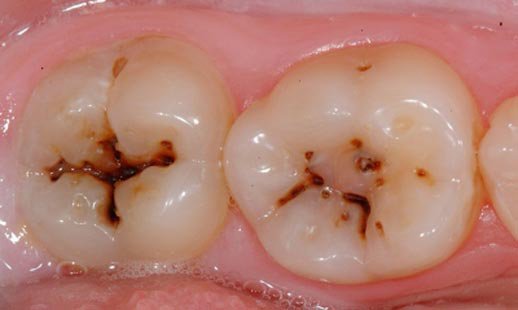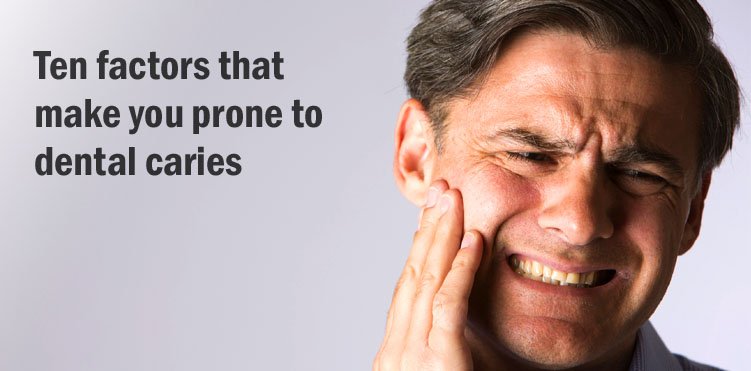10 reasons why you are susceptible to dental caries
 Dental caries or cavities are caused by the erosion of teeth due to bacterial breakdown of the hard teeth enamel. Many different types of bacteria normally live in the human mouth. But dental erosion is caused by specific types of bacteria. They produce acid that destroys the tooth’s enamel and the layer under it, the dentin. Tooth decay is a major oral health problem across the world. Without a proper oral care, anyone could have dental cavities, but some people are more prone to others: Here are top ten reasons:
Dental caries or cavities are caused by the erosion of teeth due to bacterial breakdown of the hard teeth enamel. Many different types of bacteria normally live in the human mouth. But dental erosion is caused by specific types of bacteria. They produce acid that destroys the tooth’s enamel and the layer under it, the dentin. Tooth decay is a major oral health problem across the world. Without a proper oral care, anyone could have dental cavities, but some people are more prone to others: Here are top ten reasons:
1. Diet
Unless immediately cleaned with a toothbrush and fluoridated toothpaste, sugary or refined diet leftovers in the teeth and gum line activate decaying bacteria. They destroy the protective layer of teeth which leads to cavities. People with eating disorders (imbalanced diet) and those with more acidic food intake are more prone to the caries. Since the acid attacks the enamel, which is the t is most resistant to cavities,
2. Bad hygiene
If you do not brush and floss after every meals, you are naturally prone to bacterial damage in your mouth. If you had cavites in the past, you must add a good mouthwash as well in your oral care routine.
3. Oral bacteria
Some damaging bacteria are more active in some people’s mouth than others. To combat aggressive oral bacteria, couple your regular brushing and flossing routine with an oral rinse that fights cavities by enhancing the tooth’s natural protection.
4. Dry mouth
Saliva is a natural combatant of cavities, therefore, if you suffer from dry mouth, you are naturally more prone to cavities than other. Many factors can cause dry mouth including medication side effects, chemotherapy treatments, and sickness. To combat dry mouth and protect your teeth from cavities, rinse daily with an enamel enhancing mouth wash to protect teeth and drink plenty of water to replenish natural moisture in your mouth. And consult your healthcare professional for additional treatment for dry mouth symptoms.
5. Gum Recession
If your gums recede far enough, the roots of the teeth are exposed, which means that the base of the tooth is vulnerable and any bacteria that would naturally build could cause decay much easier. Brushing with fluoridated toothpaste and a very soft brush away from the gums is important to avoid further recession. You should consult with your periodontist for timely treatment for gum recession.
6. Tooth shape
Deep grooves in your teeth catch more food particles, sugars, and destructive bacteria. These grooves pose challenge in proper cleaning regularly and are closer to the root of the tooth so any erosion that does happen is more likely to have more destructive results because of its proximity to the vulnerable part of the tooth. Ask your dental professional if your teeth are such shaped.
If you have a poor quality filling or crown in your mouth, this may lead to get a cavity by allowing plaque to hang out where you can’t reach it with routine brushing and flossing.
7. Long nursing
If you weren’t weaned from the breast or bottle until you were a toddler, this could have put you at a higher risk for getting cavities. Most research points to the bottle, but there are conflicting reports regarding prolonged breastfeeding as well.
8. Family history
There could be genetics at play if despite regular oral care you develop caries. This could be related to lack of oral hygiene being taught in the home, genetic abnormalities in the teeth, or high numbers of the damaging bacteria in your mouth.
9. Enamel defect
If you have a defect in your enamel, it could make you more susceptible to cavities. Some examples might be enamel that didn’t form correctly, congenital defects like amelogenesis imperfecta, or a defect in enamel formation that can happen to a permanent tooth when its corresponding baby tooth gets knocked out.
10. Irregular Dental Care
By not going to the dentist regularly, you avoid learning about the condition of your mouth. The dentist can point out small problems before they turn into cavities. By avoiding your checkups, you lose out on the opportunity to take care of small problems before they become big.
